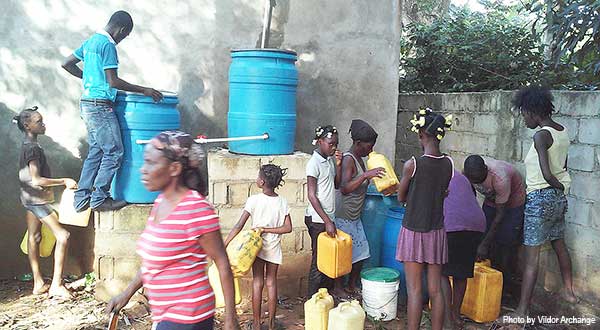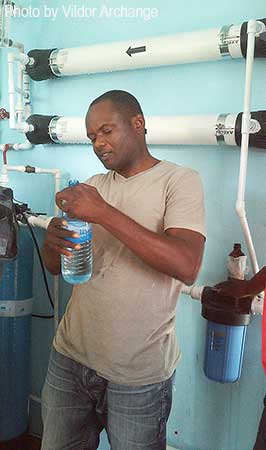Church of the Brethren Newsline
March 17, 2017

By Dale Minnich
For the past 18 months, the Church of the Brethren has been addressing the need for pure drinking water in our related communities in Haiti through the work of the Haiti Medical Project in cooperation with l’Eglise des Freres Haitiens (Church of the Brethren in Haiti). The mobile medical clinics offered since late 2011 treat many children and adults suffering from dysentery and other serious infectious diseases that often result from untreated water.
There are very few examples of improved water in the 20 communities in which we currently work. Providing better water is an urgent priority often identified by community leaders in these locations.
In 2015 the Haiti Medical Project leaders expanded the project’s community health initiatives by launching a community development team working with community leaders on a range of community issues–especially food sustainability, maternal care, and pure water. Those working directly with water projects include Vildor Archange, Jean Bily Telfort, and Adias Docteur. Global Food Initiative (GFI) manager Jeff Boshart offers helpful technical expertise.
Where pure water is a goal to be addressed, a basic way of working is to call out a water committee of community leaders. This group works closely with our staff to assess the need, provide local resources, and lead out in selecting a method to address the need. Strong local leadership and ownership is crucial to a successful project.
The focus of all our early water projects is to provide an excellent source of water for an important sector of the community rather than developing individual household systems. Our goal is to provide pure, life-giving water to as many people as possible.
In many cases the most inexpensive way of providing pure water is to harvest rain water from nearby roof tops, move it via guttering and spouting to a cement cistern, clean and purify the water through a sand bio-filter system, and add moderate chlorination as indicated by water testing. We are benefitting greatly from technical assistance in building and maintaining the sand bio-filter systems from faculty and graduate students from the University of Maryland and the University of the District of Colombia. These systems utilize locally available sand of various grades, are simple for community leaders to learn to maintain, and are well received by the community. Since Haiti has dry seasons and rainy seasons, it is important to have a cistern large enough to store enough water to serve throughout the dry season.

In some cases we contract to have a well drilled. A well can be used in conjunction with a cistern or other storage tank to cover the frequent times when electric power is not available to run a pump. It also can use sand bio-filters for purification in many cases. However, in a number of the areas near the coast, well water tends to have a salty taste that makes it much less desirable for human use. In cases where we work with an existing well that has this problem, the best solution is a reverse osmosis purification system–much more expensive than a sand bio-filter–to eliminate the salinity.
We recently discovered a resource near the Haitian church’s ministry center in Croix des Bouquets: a water school run by a service agency from the Netherlands. The project’s entire community development staff has been enrolled in a water purification course that includes learning to use reverse osmosis. We also have discovered a Brethren technician in Mexico who has extensive experience to advise us where reverse osmosis is needed. Learning and teaching the appropriate technology is highly important.
In 2015 and 2016 the Haiti Medical Project partnered with local communities to design and install successful pure water projects in St. Louis du Nord, Acajou, La Tortue, Raymonsaint, Morne Boulage, and at the Croix des Bouquets guest house. All of these use the sand bio-filter system. The Haiti Medical Project invested a total of $45,218 in these six projects in addition to the cost of materials, labor, and some financial investment contributed by the communities served.
New projects are in view for 2017-18, as funds become available. We hope to more than double the pure water systems during the next two years. While community leadership development and discernment will be cultivated before any project is approved, the following list of our present assessment of the needs is a focus for water development planned for 2017 and 2018:
— Cap Haitian and Gonaives: Improvement of existing wells through reverse osmosis
— Raymonsaint: Bio-filter system for a community where a new cistern was constructed in 2016
— Gran Bwa: Capture spring water, provide cistern, sand bio filter, and distribution system
— La Tortue: Purify water in an existing pond
— Cap Haitian, Catienne, Croix des Bouquets, Jerusalem, La Ferriere, Perisse, Savanette: Capture rain water from rooftops, construct cisterns and provide sand bio-filter systems
The preliminary estimate for the projected community pure water systems for 2017-18 is $148,000. How much can be done will be determined by the amount of special gifts for this purpose.
There are many ways congregations and individuals can get involved in supporting pure water in Haiti. For example, West Goshen (Ind.) Church of the Brethren sponsored the full cost of a well project. The children of Chiques Church of the Brethren near Manheim, Pa., contributed their regular Sunday school offerings to support water projects, amounting to $3,200 to date.
Congregations and individuals can support the full or partial cost of a current project as they choose. Contact Jeff Boshart at Jboshart@brethren.org or Dale Minnich at dale@minnichnet.org to discuss how to be a part of this important enterprise. Find out more about the Haiti Medical Project at www.brethren.org/haiti-medical-project .
— Dale Minnich is a volunteer consultant for interpretation for the Haiti Medical Project, and recently concluded a term of service as interim general secretary of the Church of the Brethren.
Go to www.brethren.org/Newsline to subscribe to the Church of the Brethren Newsline free e-mail news service and receive church news every week.